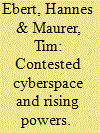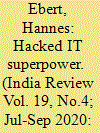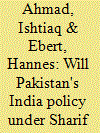|
|
|
Sort Order |
|
|
|
Items / Page
|
|
|
|
|
|
|
| Srl | Item |
| 1 |
ID:
123536


|
|
|
|
|
| Publication |
2013.
|
| Summary/Abstract |
The USA developed and has therefore historically played a lead role in cyberspace. Yet rising powers, including brics , have been increasingly challenging the established regime. China and Russia submitted a joint proposal on information security to the United Nations in 2011. India, Brazil, and South Africa have been focusing on the information society since their 2003 Brasilia Declaration. These initiatives demonstrate that cyberspace has become hotly contested. However, there is still a need to explain this divergence. Are rising powers challenging the USA because of their national interests, the urge to maximise their security, or do factors such as values and political structures explain the different trajectories vis-à-vis the hegemon? This article examines the foreign policies of brics from 1995 to date, explaining the influence of different path-dependent origins, of the systemic shift and the type of political system, together with rising civil society pressure.
|
|
|
|
|
|
|
|
|
|
|
|
|
|
|
|
| 2 |
ID:
174826


|
|
|
|
|
| Summary/Abstract |
Why has India developed into one of the world’s top targets and sources of cyber attacks despite possessing a strategic edge in information and communications technology (ICT)? India has one of the most competitive ICT industries and workforces, largest global sourcing and fastest growing e-commerce markets, and second largest and fastest growing internet user base, and is a leader in using ICT to provide governance services, yet its economic and political information infrastructures have been disproportionality affected by cyber attacks. This article traces the evolution of cyber threats to India’s national security and identifies drivers of the national and international policies the Indian state has adopted to address these threats in the past two decades. It finds evidence for a growing gap between the ideation and implementation of cyber security legislation and policy, which is rooted in the political constraints inherent in India’s state capacity-building efforts, reluctance to engage in multistakeholder coordination, and struggles to yield gains from its hedging diplomacy in global cyber security negotiations. For the Security Studies scholarship on the sources of cyber insecurity, these findings highlight the need to further study the links between different types of cyber capacity, state structure and political systems as well as the specific conditions under which quickly digitizing democracies can effectively translate their ICT capacities and regulations into greater cyber resilience.
|
|
|
|
|
|
|
|
|
|
|
|
|
|
|
|
| 3 |
ID:
131998


|
|
|
|
|
| Publication |
2014.
|
| Summary/Abstract |
Rising powers have attracted tremendous interest in international politics and theory. Yet the ways in which secondary powers strategically respond to regional changes in the distribution of power have been largely neglected. This article seeks to fill this gap by presenting a systematic comparative analysis of the different types and causes of contestation strategies undertaken by secondary powers. Empirically, it focuses on two contentious regional dyads in East and South Asia, exploring how structural, behavioral, and historical factors shape the way in which Japan and Pakistan respond, respectively, to China's and India's regional power politics. The article concludes that the explanatory power of these factors depends on the respective secondary power's particular context: in the case of Japan, China's increasingly assertive regional behavior combined with a nontransparent military buildup has invoked the most significant strategic shifts, while in the case of Pakistani contestation, an increasing threat perception in the late 1980s led to the return to a pre-1971 revisionist agenda, whereas the overt nuclearization in the late 1990s mitigated India's growing conventional superiority and enabled Islamabad to replace soft balancing with more direct means of hard balancing.
|
|
|
|
|
|
|
|
|
|
|
|
|
|
|
|
| 4 |
ID:
126109


|
|
|
|
|
| Publication |
2013.
|
| Summary/Abstract |
The May 2013 parliamentary elections in Pakistan led to a stable government under the Pakistan Muslim League-Nawaz (PML-N). Prime Minister Sharif promised a shift of the country's India policy. Given his track record, the current pressing economic and security imperatives and recent improvements in Indo-Pakistan trade relations, the popular optimism is understandable and the first steps of rapprochement are to be expected. But structural factors such as growing asymmetries, the persistent role of the army in Pakistan's India policy and the rigid discourse of ideology undermine the potential for meaningful change. While a paradigm shift is therefore unlikely in the foreseeable future, a rare window of opportunity has opened for the new leadership to assert its authority and incrementally enhance new policies.
|
|
|
|
|
|
|
|
|
|
|
|
|
|
|
|
|
|
|
|
|